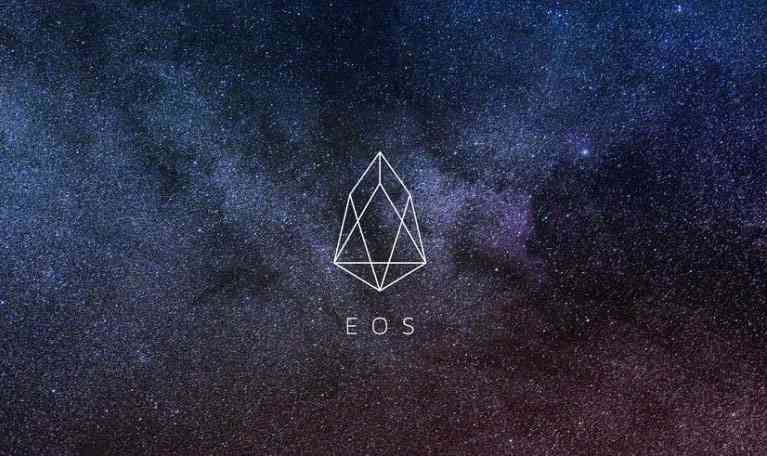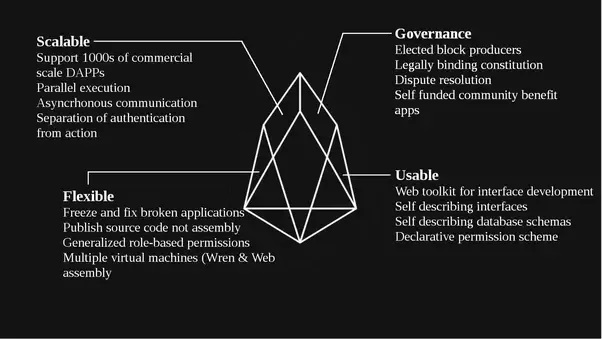EOS is a blockchain platform for the development of decentralised applications (dapps), very much like Ethereum. It makes dapp development easy by providing an operating-system-like set of services.

The core concept of EOS is to bring together the best features and promises of the various smart contract technologies out there (e.g. security of Bitcoin, computing support of Ethereum) in one simple to use, massively scalable dapplication platform.
EOS promises to lower the barrier to entry for developer and others seeking blockchain-powered solutions making it innovative and accessible in a bid to create more innovation.
How EOS works
The EOS vision is to build a blockchain dapp platform that can securely and smoothly scale to thousands of transactions per second, all while providing an accessible experience to app developers, entrepreneurs and users. They aim to provide and complete operating system for decentralised applications focused on the web by providing services like user authentication, cloud storage, and server hosting.
Control
The EOS network is a ready-made, template platform for developers to access full-featured authentication system. The latest EOS updates have enabled shared database access between accounts and the ability to store user data on a local machine off of the blockchain. Features include recovery for stolen accounts is incorporated into the system with various methods of proving your identity and restoring access to a compromised account.
Cloud-based
The EOS system includes server hosting and cloud storage are part of a package. This means application developers can build and deploy applications and web interfaces with hosting, cloud storage and download bandwidth provided by the EOS system. Engineers can program free from restrictions of storage etc. The developer will have access to usage analytics for storage and bandwidth directly from EOS, and be able to set limits for specific applications.
Scale
Experts say EOS can process millions of transactions per second with asynchronous communication and parallel processing. High transaction costs and bad throughput are Ethereum’s critical weaknesses, so these features make EOS a more popular blockchain development solution.
In practice, instead of verifying the state of the network at any given time, nodes verify the series of events that have occurred so far to keep track of network state. The result is a system that takes longer to completely reconfirm the history of transactions when restarted but can handle a much higher throughput of transactions while running.
In layman’s terms, EOS network can scale to one million messages or transactions per second on a single machine, with theoretically infinite scaling possible in parallel between multiple machines.
Cost
An application built on the EOS platform does not REQUIRE micropayments by end users to send messages and perform tasks on the blockchain. This is left up to the individual app developers to determine how transactions fees will be paid, meaning companies are free to come up with their own monetisation strategies and offer their users service for free or not. Expect more freemium business models from this technology.
Essentially, via an ownership model whereby users own and are entitled to use resources proportional to their stake, rather than having to pay for every transaction.
Efficient and effective
The EOS system reduces the latency and maximises performance by structuring each block (produced every 3 seconds currently and being tested at 0.5 seconds) even more finely into “cycles,” which are sequentially performed. Cycles are in turn structured into “threads” that run in parallel within cycles. This allows for messages and transactions to be sent and responded to within single blocks and between blocks, bringing the theoretical bottom limit to the response time down to simply message transmission time over the net.
Recent trading performance
The recent altcoin rally, led by EOS shows that many cryptocurrencies are due for a bull run against Bitcoin. It has grown from $4 to $23.5 at its peak but this was due to its recent spring release of EOSIS DAWN 4.0 driving the price. We’ve seen record highs for some coins in May before. TRON (TRX) and Stellar (XLM) are classic examples springing back from huge sell-offs. Normally, this would be happening at a comparatively slower pace but this year also coincides with a major bullish scenario for Bitcoin (BTC) projecting its price at $100,000 and higher. EOS is hard to be predicted as it is linked with Bitcoin rallies but now new tech is released and Ethereum has a status of a “non-compliant security” we would expect to see more than 5x growth of recent weeks.
